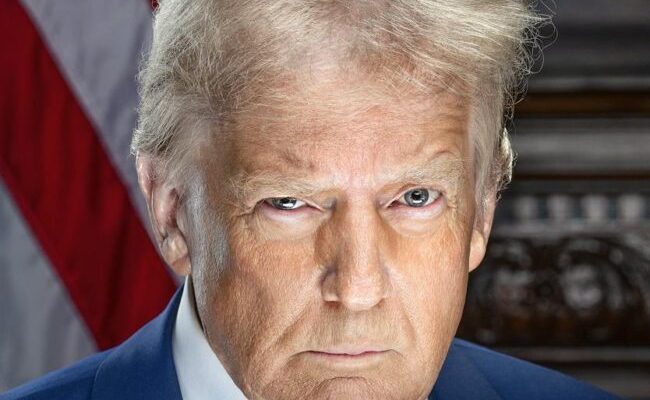Professor Carl Levan, Chair of Politics, Governance, and Economics at the School of International Service, American University in Washington, D.C., has issued a stark warning to African nations about the far-reaching security and economic consequences of US foreign policy under President Donald Trump’s second term. His concerns were voiced during the most recent edition of the Toyin Falola Interviews, a global platform renowned for elevating African perspectives on key global issues.
This latest episode, titled President Trump and Africa, featured an esteemed panel of experts, including Professor Toyin Falola himself, alongside Christopher Isike, Kingsley Makhubela, and Ayisha Osori. The discussion, which was streamed live to a global audience of over three million across social media platforms, international radio, and television stations, provided a sobering analysis of Trump’s policies and their implications for Africa.

Professor Levan expressed grave concerns about the potential fallout of President Trump’s expansionist foreign policies, highlighting how such strategies could exacerbate global insecurity. “If the president’s foreign policies are centred around expansionism, then I am worried about the opportunities that create for more military threats and terrorist threats,” Levan warned.
Citing Trump’s militaristic tendencies and historical rhetoric invoking imperialist ideals, Levan pointed to the deployment of 10,000 US troops to the Mexican border during Trump’s first term as an example of the administration’s disregard for international norms. He noted that this move signalled a violation of both domestic principles and international law, reflecting a trend of aggressive posturing that could have broader global consequences.
For Africa, the implications are particularly acute. Levan stressed that regional instability in the Sahel and beyond could be further destabilized if African nations do not prioritize counterterrorism strategies and regional security cooperation. “Africa should be thinking about how to stabilize the Sahel and implement shared strategies for tackling security challenges,” he advised.
Turning to trade policy, Levan criticized the Trump administration’s apparent disregard for fostering economic partnerships with Africa. He highlighted a sharp decline in trade volume during Trump’s first term, which fell to $6 billion compared to the $9.2 billion recorded under President Biden.
A specific concern was the exclusion of the African Growth and Opportunity Act (AGOA) from the administration’s January 20, 2025, trade memo. AGOA has long been a cornerstone of US-Africa trade relations, promoting economic development across the continent by granting duty-free access to the US market for specific goods. Its omission from Trump’s policy priorities raised red flags about the administration’s commitment to Africa’s economic growth.
Levan also noted that the Trump administration’s tariff policies had created a flood of requests for exemptions, with the Office of the US Trade Representative receiving over 50,000 such petitions. “The ‘America First’ trade policy creates fragmentation and elite-driven politics that hurt democracy in the United States and its relationships with Africa,” Levan said.
Climate change emerged as another critical area of concern during the discussion. Levan underscored the disproportionate impact of global warming on Africa, with the continent warming at a rate of 0.3 degrees Celsius per decade—faster than the global average.
He criticized Trump’s rollback of key environmental commitments, including the withdrawal from the Paris Climate Accord and executive orders promoting fossil fuels over renewable energy. These policies, he argued, undermine global efforts to combat climate change and disproportionately harm Africa, which contributes minimally to global emissions but bears the brunt of their effects.
“Africa’s warming trajectory highlights how global warming disproportionately impacts the continent, even though other regions disproportionately cause it,” Levan stated. He called for African nations to take a leadership role in advocating for global environmental justice while investing in local adaptation strategies.
Professor Levan also addressed the Trump administration’s controversial immigration policies, which he argued have further strained US-Africa relations. These include the attempted Muslim immigration ban and a significant decline in student visas granted to Africans during Trump’s first term.
“These policies reflect a broader trend of exclusion and disregard for the contributions of immigrants, particularly from Africa,” Levan said. He urged African leaders to advocate for fairer immigration policies and to explore opportunities for regional partnerships that reduce dependence on the United States.
Levan drew parallels between Trump’s populist leadership style and the “big man” political archetype often associated with African politics. “Trump is in the tradition of the big man in some ways. He will be studied by political scientists for many years for his unusual staying power through populism,” Levan observed.
Historically, he noted, populist movements tend to be short-lived, arriving with great intensity but quickly dissipating. Trump’s ability to build a durable coalition of labour and capital, however, sets him apart. Levan warned that this brand of populism could have global repercussions, including increased militarization and a further erosion of democratic norms.
“The traditional understanding of America’s foreign policy was one of isolationism,” Levan said, referencing President George Washington’s farewell address cautioning against “foreign entanglements.” However, Trump’s rhetoric and actions suggest a revival of imperialism, he argued, with potentially destabilizing effects on global security.
Professor Levan urged African nations to take proactive steps to address the challenges posed by Trump’s foreign policies. These include investing in regional security frameworks, strengthening counterterrorism efforts, and advocating for fairer trade and environmental policies on the global stage.
He emphasized the need for African leaders to focus on domestic stability and resilience, particularly in the Sahel region, where insecurity remains a pressing concern. “Africa must brace for the fallout and be proactive in securing their regions from external and internal threats,” Levan said.
ALSO READ TOP STORIES FROM NIGERIAN TRIBUNE







